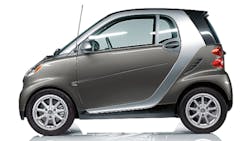Automaker Daimler AG is buying the 50.1% stake in Li-Tec Battery GmbH held by its joint venture partner Evonik Industries AG, giving it full control of the lithium-ion battery-cell manufacturer. Li-Tec Battery, formed in 2006, develops and manufactures large lithium-ion battery cells used in the electric drive system for the Mercedes smart fortwo rear-engine ‘city car.’
Daimler also will buy Evonik’s 10% stake in their Deutsche Accumotive battery partnership and will gain full control of that business, too. This company was formed in 2009 to develop and manufacture electric mobility technologies, i.e., automotive electric drive systems.
Lithium-ion batteries are rechargeable devices frequently used as an electric car power source, typically involving several smaller units in a parallel circuit.
The terms of the buy-outs were not indicated.
Li-Tec has a plant near Dresden, Germany, with approximately 380 employees, while Deutsche Accumotive has two locations — an R&D center near Daimler headquarters in Stuttgart, another plant near the Li-Tech operation — and approximately 230 employees.
Evonik is a specialty chemicals manufacturer that formed the Li-Tec venture with Daimler in 2006 to develop and produce electric fuel cells for automobiles. In a joint statement on the current transactions, the partners referred to “changed market conditions” in the electric vehicle sector, referring to stagnant demand for electric cars.
Sales have been weak for electric vehicles offered by various automakers, though the electric version of Daimler’s Mercedes smart car took about 30% of the market among new models in Germany last year.
Also, Mercedes-Benz owns a small percentage of Tesla Motors Inc., and Mercedes will use a Tesla drivetrain in an all-electric version of its compact B-Class cars.
Evonik CEO Klaus Engel indicated last fall that significant new capital infusion would be required for it to continue developing the automotive battery technology, explaining why it would liquidate its stake in the two businesses.
“Evonik and Daimler have found a good solution,” according to Thomas Hermann, head of corporate development at Evonik. “The agreement creates important opportunities for Germany as an industrial location in an international environment of intense competition.”
Harald Kröger, who heads development for Mercedes-Benz Cars Electrics/Electronics, explained: “Along the value chain for drive-system batteries with lithium-ion technology, we now have the two most important components: the production of battery cells and the related development and production of highly complex drive-system batteries as a combination of cells and battery electronics.”
About the Author
Robert Brooks
Content Director
Robert Brooks has been a business-to-business reporter, writer, editor, and columnist for more than 20 years, specializing in the primary metal and basic manufacturing industries.
